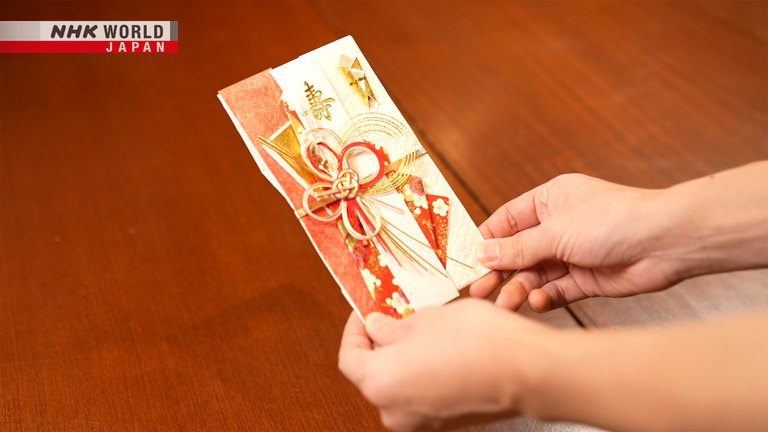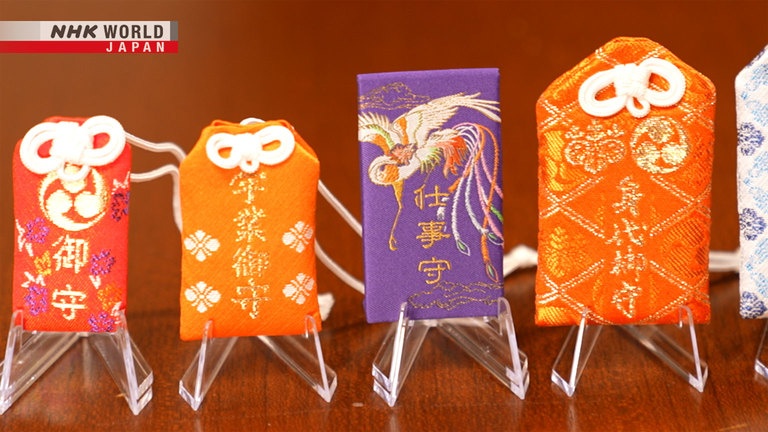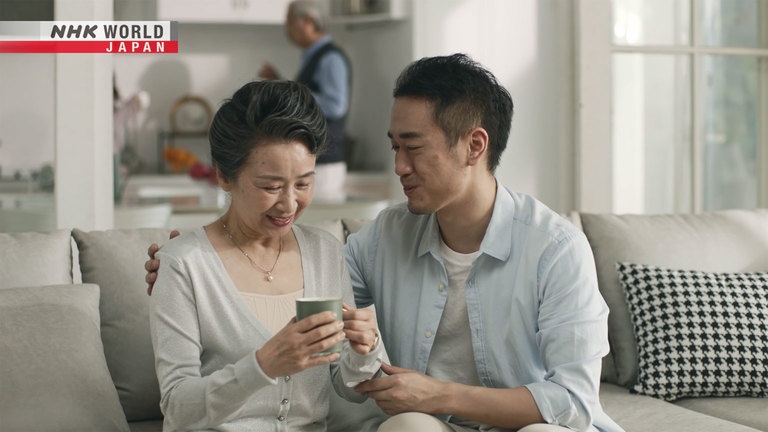Bag
This episode focuses on words related to fukuro (bag). Reflecting its unique wrapping culture, Japan has a wide variety of bags, leading to an equal variety of Japanese words and expressions.




Transcript
"Yukigesho."
"Karakurenai."
The Japanese language is rich in unique expressions that reflect nature and culture.
Magical Japanese.
Today's theme is "fukuro," meaning "bag."
Hello. I'm Peter MacMillan.
Many kinds of bags exist in Japan.
And some of these are the kind that can be closed with drawstrings.
This is a "kinchaku bukuro" bag, which is used to carry small articles such as wallets,
and then we have the "obento bukuro," which is used to carry lunch boxes.
Then we have the "nioi bukuro," which people use to enjoy pleasant smells.
Today, let's look at some unique bags and get a feel for the culture of Japanese bags.
"shugi bukuro."
"Fukuro" changes to "bukuro" when preceded by another word.
And "bukuro" is also used to refer to envelopes.
"Shugi" is gift money or a tip.
"Shugi bukuro" is a paper envelope used specifically for a monetary gift.
In Japan, it is customary to present money on celebratory occasions such as a wedding or a promotion.
Instead of bare notes, the money is always wrapped in a "shugi bukuro."
"pochi bukuro."
This is a smaller envelope used for more casual occasions -
for example, when giving children an allowance, or presenting a small amount of money to relatives.
They come in a variety of designs, from traditional patterns to those featuring popular characters.
In this case, "pochi" means "a small amount of."
Tipping is not common in Japan.
But if you were to offer someone a tip, using a "pochi bukuro" would be a good idea.
"fuku bukuro."
"Fuku" means happiness and good luck.
"Fuku bukuro" are sealed bags that shops sell at the start of the new year.
The bags are filled with various products and are meant to bring good luck to customers.
People buy the bags without seeing the contents and open them at home.
This is one way to test their luck for the coming year.
Japanese bag culture is deeply associated with the concept of "tsutsumu," or "wrapping."
"Tsutsumu" was originally done when carrying objects around, or when storing food.
The wrapping would protect the contents from damage.
But "tsutsumu" in Japanese can also mean to hide or keep from view something important.
It is used for example when separating sacred objects from those deemed evil to prevent harm.
The next bag is another good example.
"omamori bukuro."
These amulets, sold at shrines and temples, are believed to protect against bad luck and bring good fortune.
Inside is a piece of paper, wood, or metal called "ofuda."
Thanks to special prayers, the "ofuda" are said to have special powers.
The "omamori bukuro" protects the ofuda from damage while helping to maintain its divine power.
There are many kinds of "omamori bukuro," such as those for road safety and academic success.
Another bag you might see often in restaurants is "hashi bukuro," or "chopstick bags."
Chopsticks, used to bring food to the mouth, were once considered to be sacred instruments.
And, as each pair of chopsticks is individually wrapped, they are actually quite sanitary.
The Japanese don't just put visible objects into bags.
"chie bukuro."
"Chie" is wisdom.
"Chie bukuro" is an imaginary bag filled with wisdom.
These days, it's used to refer to a wise and knowledgeable person.
This is our first project of this kind.
Let's get advice from our "chie bukuro"
- brain.
"chie bukuro."
"chie bukuro."
The next bag is something to be handled with care.
"kannin bukuro no o ga kireru."
"Kannin" is the act of holding back your anger and forgiving other's mistakes.
"O" is the string of a drawstring bag.
"Kireru" means "to be cut."
The phrase is used when your anger becomes uncontrollable, and you explode.
It likens the situation to a bag bursting open after being filled to the limit.
The way he ignored the rules finally caused us to
"kannin bukuro no o ga kireru" - boil over.
"kannin bukuro no o ga kireru."
"kannin bukuro no o ga kireru."
"fukuro no nezumi."
"Nezumi" is "mouse."
The phrase translates as "mouse in a bag,"
and refers to someone who is backed into a corner, with no way out.
"fukuro no nezumi."
"fukuro no nezumi."
There are also cases where bags are associated with the human body.
"ibukuro o tsukamu."
"Ibukuro" means "stomach."
"Tsukamu" means "to get hold of," and the expression means to attract someone with your cooking.
It's commonly used for a romantic partner or someone you might live with in the future.
He practices cooking every day to "ibukuro o tsukamu"
- win over the heart of - his girlfriend.
"ibukuro o tsukamu."
"ibukuro o tsukamu."
"ofukuro."
Here "o" is an honorific.
This word is commonly used by men as an affectionate word for "mother" - their own or someone else's.
This word first appeared in the Muromachi period.
It was original ly a respectful way to say "mother," and even used for noble women.
But as time passed, it was adopted by the wider public.
There is no definitive explanation as to why mothers are compared to bags.
One theory says that it comes from the bag-like membrane that envelops the fetus in the womb.
Another says it comes from the mother being in control of the money bag used for household finances.
As we have seen today, however, bags wrap sacred objects and protect them from evil.
It makes sense then that children would associate bags with their mothers.
"ofukuro."
"ofukuro."
If you actually come to Japan, I think you will find a rich variety of bags everywhere you go.
See you next time. Bye!